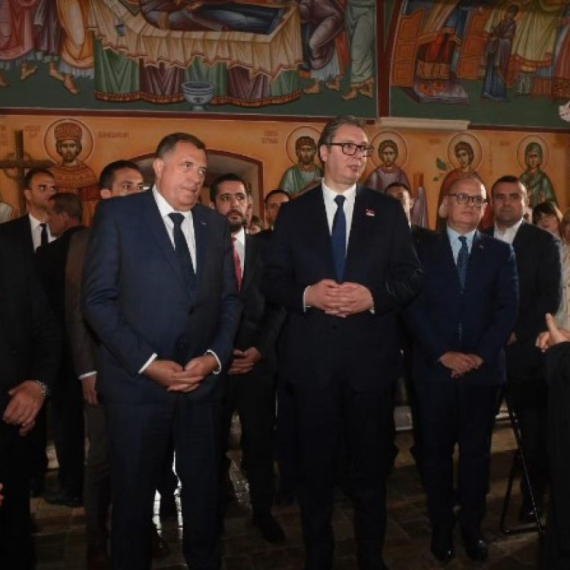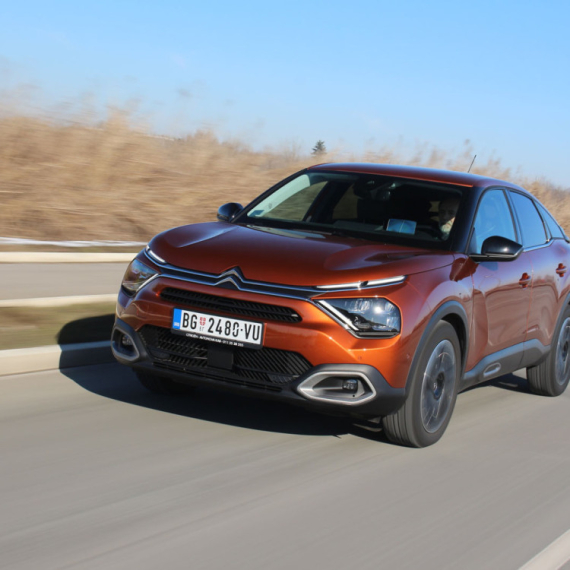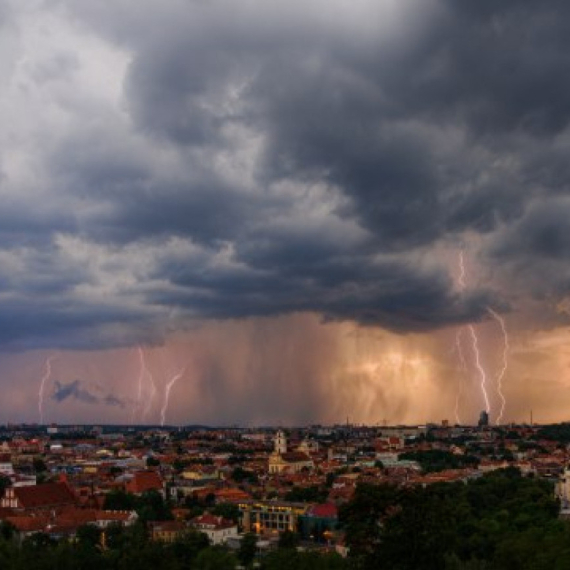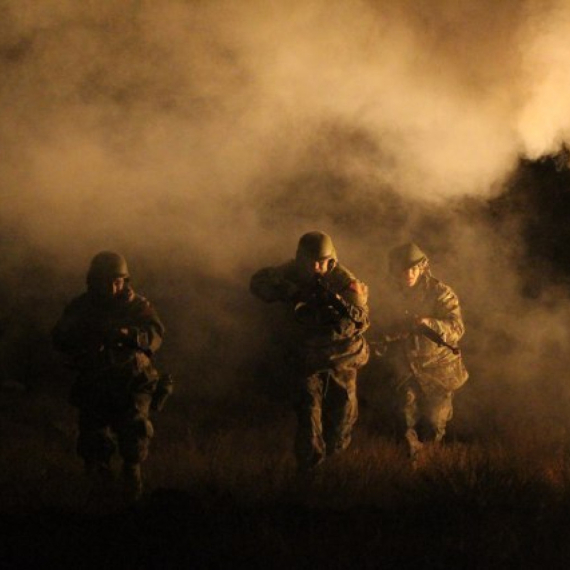Trilateral summit held in Turkey
The leaders of Serbia, Turkey and Bosnia-Herzegovina met in Ankara today at a trilateral summit and discussed further cooperation and issues in the region.
Wednesday, 15.05.2013.
09:56

ANKARA The leaders of Serbia, Turkey and Bosnia-Herzegovina met in Ankara today at a trilateral summit and discussed further cooperation and issues in the region. Serbian President Tomislav Nikolic said that Serbia would invest maximum effort to intensify regional cooperation so that South East Europe would be politically and economically stable, and expressed hope Turkey would have a larger economic presence in the region in the future. Trilateral summit held in Turkey After a plenary meeting during a trilateral summit of Turkey, Serbia and Bosnia-Herzegovina, Nikolic told a news conference that the meeting had resulted in stronger political ties, but even greater emphasis should be placed on economic cooperation. "Serbia wants to continue this trilateral cooperation and I am sure our meetings will contribute to furthering our relations. I am certain Serbia's sustainable development is not possible without friendly relations in the region and we will invest additional efforts in cooperation on all levels, so our future would be stable and focused on economic progress," said Nikolic. Welcoming the signing of a trilateral declaration on economic and trade cooperation and a declaration of the three countries' chambers of commerce, he said that all countries created after the breakup of the former Yugoslavia had a hard time finding success in foreign markets on their own and stressed the need for cooperation. "Turkey is a partner that can help us reach markets we have not opened, it can help us achieve this through its investments and our technology, because we have an exceptionally educated workforce," said the Serbian president, noting that countries in the Western Balkans were capable of developing and implementing the latest technologies, but lack the capital. Speaking about relations between Serbia and Bosnia-Herzegovina, he said that despite the past which was a major burden on both countries, he wanted them to be partners and develop strong relations, particularly in the economy. “Serbia is committed to developing cooperation based on good-neighborliness and will endeavor to strengthen it with both entities in Bosnia-Herzegovina, the Federation of Bosnia-Herzegovina and the Republic of Srpska, while continuing to deepen special ties with the latter,” said Nikolic. “Serbia supports consistent implementation of the Dayton Agreement and the integrity and sovereignty of Bosnia-Herzegovina as the foundation for regional stability,” he stressed. "As far as the future of Bosnia-Herzegovina is concerned, we believe it should be decided by its citizens, whose will is enacted by political leaders, without meddling from outside. Serbia will accept any agreement reached by the three constitutive peoples in Bosnia-Herzegovina," said Nikolic. According to him, Serbia sees Turkey as a very important partner, with whom it does not agree on all issues, but with whom it wants to advance bilateral relations and contribute to regional stability. Turkish President Abdullah Gul told the news conference that previous trilateral meetings had produced concrete steps, welcoming the thawing of relations between Belgrade and Sarajevo, which resulted in members of the Bosnia-Herzegovina Presidency visiting Belgrade and what he called brave and constructive statements from the Serbian president. “All of this has created this positive atmosphere and we are all very happy that Serbia is making progress towards the EU,” said Gul. According to him, the three presidents focused on economic cooperation in their meeting Wednesday. “All three countries must be determined in conducting reforms which will encourage foreign investors, and I am sure they will embark on major projects together,” the Turkish president noted. “We are three countries in the Balkan peninsula and through our relations, we are trying to strengthen internal stability and peace and contribute to regional peace. I would like to see all Balkan countries embark on the Euro-Atlantic integration, because that would make problems easier to solve,” said Gul. Bosnia-Herzegovina Presidency Chairman Nebojsa Radmanovic said the relations among the three countries were currently at a very high level, but that economic cooperation was not keeping up with the political. On behalf of the Bosnia-Herzegovina Presidency, he invited companies to invest in the country. "We also expect the volume of trade with both Turkey and Serbia to improve, which is realistic after our trilateral meetings," said Radmanovic. During the day, Nikolic will also have bilateral meetings with Gul, and with members of the Bosnia-Herzegovina Presidency - Radmanovic, Bakir Izetbegovic and Zeljko Komsic. The summit in Ankara is the third trilateral meeting between the presidents of Serbia, Turkey and Bosnia-Herzegovina. The first one was held in Istanbul in 2010 and the second one in Karadjordjevo, Serbia, in 2011. Tomislav Nikolic and Abdullah Gul are seen in Ankara (Beta/Turkish Presidency) Tanjug
Trilateral summit held in Turkey
After a plenary meeting during a trilateral summit of Turkey, Serbia and Bosnia-Herzegovina, Nikolić told a news conference that the meeting had resulted in stronger political ties, but even greater emphasis should be placed on economic cooperation."Serbia wants to continue this trilateral cooperation and I am sure our meetings will contribute to furthering our relations. I am certain Serbia's sustainable development is not possible without friendly relations in the region and we will invest additional efforts in cooperation on all levels, so our future would be stable and focused on economic progress," said Nikolić.
Welcoming the signing of a trilateral declaration on economic and trade cooperation and a declaration of the three countries' chambers of commerce, he said that all countries created after the breakup of the former Yugoslavia had a hard time finding success in foreign markets on their own and stressed the need for cooperation.
"Turkey is a partner that can help us reach markets we have not opened, it can help us achieve this through its investments and our technology, because we have an exceptionally educated workforce," said the Serbian president, noting that countries in the Western Balkans were capable of developing and implementing the latest technologies, but lack the capital.
Speaking about relations between Serbia and Bosnia-Herzegovina, he said that despite the past which was a major burden on both countries, he wanted them to be partners and develop strong relations, particularly in the economy.
“Serbia is committed to developing cooperation based on good-neighborliness and will endeavor to strengthen it with both entities in Bosnia-Herzegovina, the Federation of Bosnia-Herzegovina and the Republic of Srpska, while continuing to deepen special ties with the latter,” said Nikolić.
“Serbia supports consistent implementation of the Dayton Agreement and the integrity and sovereignty of Bosnia-Herzegovina as the foundation for regional stability,” he stressed.
"As far as the future of Bosnia-Herzegovina is concerned, we believe it should be decided by its citizens, whose will is enacted by political leaders, without meddling from outside. Serbia will accept any agreement reached by the three constitutive peoples in Bosnia-Herzegovina," said Nikolić.
According to him, Serbia sees Turkey as a very important partner, with whom it does not agree on all issues, but with whom it wants to advance bilateral relations and contribute to regional stability.
Turkish President Abdullah Gul told the news conference that previous trilateral meetings had produced concrete steps, welcoming the thawing of relations between Belgrade and Sarajevo, which resulted in members of the Bosnia-Herzegovina Presidency visiting Belgrade and what he called brave and constructive statements from the Serbian president.
“All of this has created this positive atmosphere and we are all very happy that Serbia is making progress towards the EU,” said Gul.
According to him, the three presidents focused on economic cooperation in their meeting Wednesday.
“All three countries must be determined in conducting reforms which will encourage foreign investors, and I am sure they will embark on major projects together,” the Turkish president noted.
“We are three countries in the Balkan peninsula and through our relations, we are trying to strengthen internal stability and peace and contribute to regional peace. I would like to see all Balkan countries embark on the Euro-Atlantic integration, because that would make problems easier to solve,” said Gul.
Bosnia-Herzegovina Presidency Chairman Nebojša Radmanović said the relations among the three countries were currently at a very high level, but that economic cooperation was not keeping up with the political.
On behalf of the Bosnia-Herzegovina Presidency, he invited companies to invest in the country.
"We also expect the volume of trade with both Turkey and Serbia to improve, which is realistic after our trilateral meetings," said Radmanović.
During the day, Nikolić will also have bilateral meetings with Gul, and with members of the Bosnia-Herzegovina Presidency - Radmanovic, Bakir Izetbegović and Željko Komšić.
The summit in Ankara is the third trilateral meeting between the presidents of Serbia, Turkey and Bosnia-Herzegovina. The first one was held in Istanbul in 2010 and the second one in Karađorđevo, Serbia, in 2011.



































Komentari 1
Pogledaj komentare